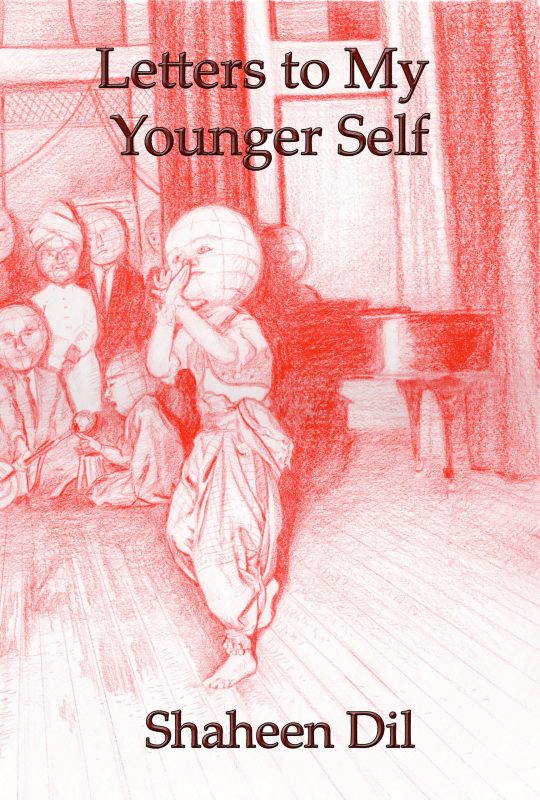Letters to My Younger Self by poet Shaheen Dil.
Book available from Amazon in paperback and Kindle ebook, or from the author.
Praise for Letters to My Younger Self
Where do you end and I begin?” is the question which haunts Shaheen Dil’s remarkable memoir-in-poems. Addressed to Choiti, her younger self, Dil’s poems shepherd us from Old Dhaka—a childhood stitched from blue silk garara, mango trees, rikshaws, and the love of her Ammu and Abbu—to Chicago and then Ann Arbor, where “a new world thrust[s]” her into days of forgotten Bengali, the joy of Twinkies, and stone quarries. “You didn’t know that you were an immigrant,” Dil tells herself in revelation after revelation, her parents’ divorce sweeping her back to Nazimuddin Road, then Lahore, Queen Mary’s College, parathas and pomegranate chutney sweetening 117 degree days. In the way of Whitman, Dil discovers that she “contain[s] multitudes” as America beckons again—Bloomington, Columbia, Poughkeepsie, Boston, an ever-revolving door of places, experiences, and selves made new. I am reminded of Gaston Bachelard’s words in The Poetics of Space: “Immensity is within ourselves.” Dil’s journey is at once powerful and circular, transformative and tender. These wonderful poems leave me breathless, ecstatic, eager to seek out the selves which made me. They leave me yearning to ask the Choiti still lingering in all of us: “Where might I end and you begin again?”
Sara Henning is the award-winning author of the poetry collections Burn (Southern Illinois University Press, 2024), Terra Incognita (Ohio University Press, 2022), and View from True North (Southern Illinois University Press, 2018). She teaches at Marshall University, where she coordinates the A.E. Stringer Visiting Writers Series.
In her third collection of poems since 2016, Dil weaves a dialogic narrative with herself that reaches across the distances of time and place to create a tapestry of pleasurable and painful memories. As Shaheen recalls and addresses Choiti in each of these testamentary poems, we can feel the uncanny power of the lyrical word to retrieve and reconstitute formative moments from the speaker’s living past in the imagination. And gradually but assuredly, as we follow the chronology of this collection, we find ourselves asking: who is I here and who is you. Ultimately, Dil’s collection of recollection returns otherwise private moments from her past to a future in poeisis, where much like the universal experience of the “uncanny,” the poet brings to light what by its nature is mysterious and secret.
The Bulgarian poet Lyubomir Nikolov is the author of numerous books, translated into seven languages. He received the National Southern Spring Award in 1982 and the Third Annual Settlement House American Poetry Prize in 2016. His latest book is The Wine’s Angel (Fakel Press 2018).
Author Bio
Shaheen Dil is a reformed academic, banker, and consultant who now devotes herself to poetry. She was born in Bangladesh and lives in Pittsburgh. Her poems have been widely published in literary journals and anthologies. Her poem “River at Night” was a winning poem in the Passager 2021 Poetry Contest. Her poem “The Red Thread” was nominated for a Pushcart Prize. Dil has published two books of poetry, Acts of Deference (Fakel 2016) and The Boat-maker’s Art (Kelsay Books 2024). Dil is a member of the Pittsburgh Poetry Exchange, the DVP/US1 Poets, and the Porch Poets. She holds a BA from Vassar College, a master’s degree from Johns Hopkins University, and a Ph.D. from Princeton University. Additional information is available on her website: www.shaheendil.com
Review of Letters to My Younger Self
Review: A poet confronts her youth
Gary Ciocco
Pittsburgh Post Gazette Jul 6, 2025
Shaheen Dil’s third poetry collection, “Letters to My Younger Self,” is a memoir-in-verse that is concise, direct, and propulsive as it marshals insight and sensitivity — and photos — covering the first two-and-a-half decades of Dil’s life in sixty pages.
Dil was born in Bangladesh and now lives in Pittsburgh. Having worked in academia and banking, she devotes her retired labor to poetry. Her reflexive search for self is defined in the first letter/poem, sent from Pittsburgh in 2024.
Dil begins by asking Choiti — her childhood nickname — “Where do you end and I begin?” and concludes by flipping the question, “Where might I end and you begin again?,” to great effect.
Dil speculates to Choiti that “….your love of ritual started” with a first language lesson that combined Bengali elements with the Muslim “Bismillah” ceremony. (The poet explains this, and other key aspects of Bengali language and culture, in a very useful appendix.) But as much as ceremony, ritual and culture dominate, in “Letter 2,” a memory from age three reminds her that “you were always dancing / to… / music unheard by others.”
Dil recalls visiting the prison where Abbu, her father, spent years for promoting the Bengali National Language Movement. Her father, already absent much, then disappeared after a divorce.
Dil chronicles this time through moments with her younger sister, Saku. On the veranda they “played tiddlywinks / with cowrie shells,” and also witnessed Ammu — her mother — and Abbu “shouting, flinging pots. // Embedded in that instant the next fifty years – / their rift, / your future lives.”
There is an allegorical nature to the discord Choiti saw and experienced; she names a servant boy who stole from them, then writes that “Shoaib wasn’t really his name….// But this story could be true of all Shoaibs.”
In “Letter 11,” she juxtaposes “the joy” of riding an elephant in 1959 with concern about the “cruelties” behind her mother’s purchase of a jewelry box “inlaid with ivory.” The next year she was brought to Ann Arbor, Michigan, and threw herself headlong into homework, American food — “how you loved those Twinkies”— and exploring with friends.
Choiti and Saku travel to Lahore in 1962 to visit their mother’s new family, but arrive “six months after Mom,” in order to give “skeptical in-laws time to know her, / unclouded by divorce, / two daughters living evidence of that shame.” The tensions continue. After returning to America, she recounts how it may have been “the color of our skin” which led to her and Saku being the only high school forensics team members to have a room to themselves at their first away tournament.
College at Vassar brought vast freedom to explore “boys, wine, movies,” but also being told by a faculty advisor that not much mattered, “since we would all marry and have children.” To boys bused in from Yale and Princeton “you were an exotic distraction. // …a brown girl in a white world, / but you didn’t know it.”
In graduate school in DC, Dil dates, reads “The Feminine Mystique,” and eats calamari for the first time. She attends Mass with a Catholic friend and “longed to belong to that pageantry! If only Islam had glamor.”
The book winds down with Dil meeting her soon-to-be-husband Clark at Princeton — she “argued with a guy across the / table, / so supremely annoying the discussion never ended — / even half a century later.”
Her stepfather, a mentor to her, disowned her for agreeing to marry a Jewish man, but her mother attended the wedding anyway, on a day with “the sun relentless.”
“Restless” and “relentless” describe the Shaheen Dil who gets brought back to life in “Letters to My Younger Self.” The vagaries of time and place, of different cultures, religions, and the subjugation of women, keep Choiti firmly mythical despite her clear connection to the present-day Shaheen. No longer must the poet worry that “I am waking in a world you can’t yet reach.”
Gary Ciocco is a traveling philosophy professor and poet who lives south of Pittsburgh.
First Published: July 6, 2025, 4:30 a.m.
More from Gyroscope Press:
That Infinite Roar by Laurie Kuntz
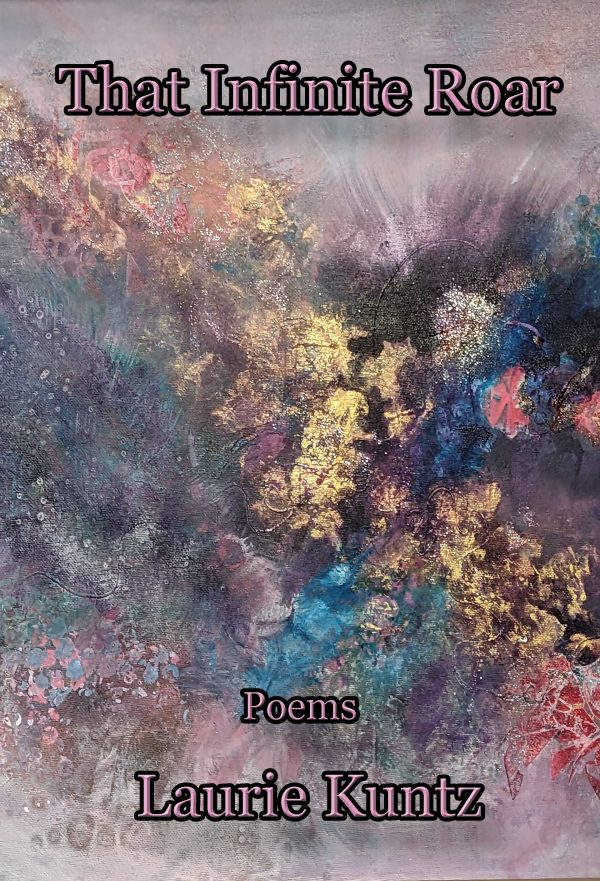
The Space Carved by the Sharpness of Your Absence by Nancy Murphy
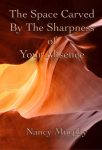
Continuity by Norma Wilson
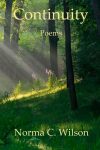
Living in Laconia by Ruth Holzer

How We Learned To Shut Our Own Mouths by Kathleen Cassen Mickelson
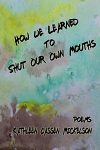
Something Like a Life by Sally Zakariya

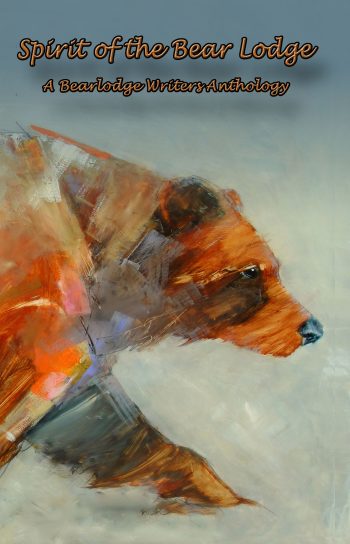
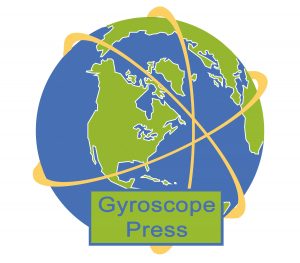
© 2028 Gyroscope Press All Rights Reserved
